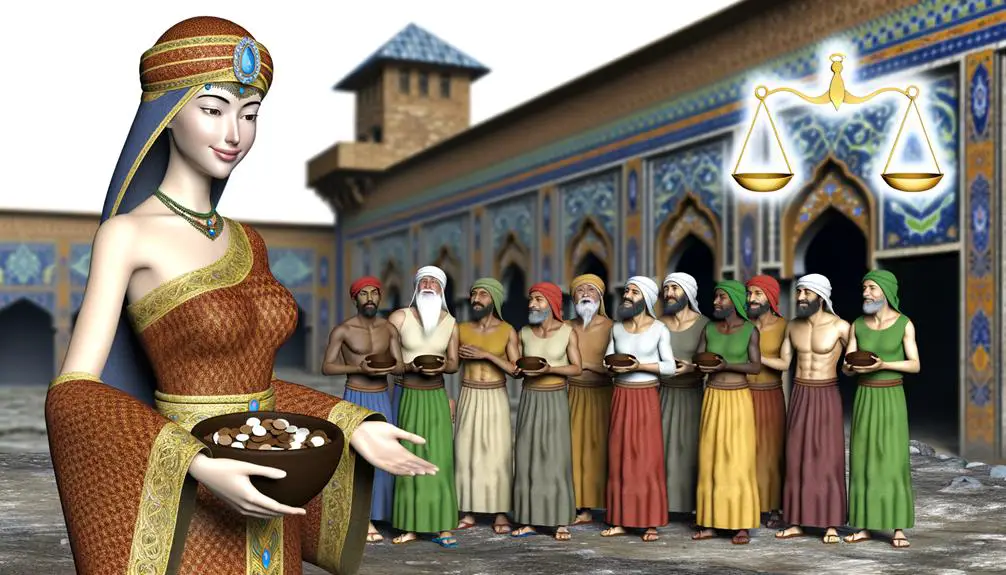Gain insight into the Bible's complex portrayal of shrewdness, where divine wisdom meets human cunning in unexpected ways.

Shrewd in the Bible
Just as Odysseus used his wits to navigate the treacherous waters of the Greek myths, various figures throughout the Bible employed shrewdness to overcome obstacles and fulfill divine plans.
You'll find that the Bible doesn't shy away from showcasing the complexities of human intelligence and cunning. From the parable of the shrewd manager to Joseph's strategic management of Egypt's resources, the texts invite you to ponder the role of wisdom and astuteness in a faith context.
But what do these stories collectively suggest about the nature of shrewdness itself? Unpacking these narratives might just challenge your understanding of wisdom and morality in biblical terms.
Key Takeaways
- Biblical narratives illustrate the virtue of shrewdness balanced with ethical conduct and spiritual discernment.
- Shrewd actions, when guided by foresight and wisdom, can lead to positive outcomes and the preservation of well-being.
- The Bible champions strategic thinking and prudence, showcasing the benefits of being astute in complex situations.
- Stories of shrewdness in the Bible underscore the importance of humility, self-awareness, and the transformative power of forgiveness and redemption.
The Parable of the Shrewd Manager

In examining the Parable of the Shrewd Manager, one quickly realizes that its lessons delve deep into the complexities of ethical behavior and financial stewardship. This biblical narrative presents you with a challenging scenario: a manager, knowing he'll soon lose his job, decides to reduce the debts owed to his master by his clients. At first glance, it's easy to question his actions, labeling them as dishonest. However, a closer look reveals a nuanced lesson on managing resources and navigating ethical dilemmas.
You're invited to reflect on the manager's actions. Was he merely safeguarding his future at the expense of his master, or was there a deeper wisdom in his shrewdness? This parable pushes you to consider the fine line between unethical behavior and wise stewardship.
Managing resources, especially in times of crisis, requires a delicate balance. The manager's strategy to secure his future by winning the favor of the debtors highlights the tension between self-preservation and ethical conduct. You're left pondering the implications of his actions, not just for himself but for all involved.
In grappling with these ethical dilemmas, you're encouraged to think critically about your own decisions in managing resources. The parable doesn't offer clear-cut answers but rather serves as a mirror, reflecting the complexities of human behavior and the ethical considerations that come with financial stewardship.
As you delve deeper into the story, you realize it's not just about financial management but about the broader implications of making choices that straddle the line between cleverness and integrity.
Joseph's Wisdom in Egypt

Reflecting on the complexities of ethical decision-making through the Parable of the Shrewd Manager, let's now explore Joseph's display of wisdom in managing Egypt's resources during a time of severe famine.
Joseph's journey from being sold into slavery by his brothers to becoming the Pharaoh's most trusted advisor is a testament to his shrewdness and foresight. His ability to interpret the Pharaoh's dreams accurately was the first step in preparing Egypt for the upcoming seven years of famine. This dream interpretation wasn't just a moment of spiritual insight; it was a masterclass in recognizing and preparing for future challenges.
- Dream Interpretation: Joseph's interpretation of the Pharaoh's dreams about seven lean cows eating seven fat cows and seven thin ears of grain swallowing seven healthy ones was pivotal. It wasn't just about understanding dreams but about seeing the underlying messages and acting on them.
- Strategic Planning: Upon interpreting the dreams, Joseph didn't stop there. He proposed a comprehensive plan to collect and store surplus grain during the seven years of plenty. This wasn't just foresight; it was a strategic utilization of resources.
- Famine Management: When the famine hit, Egypt was ready. Joseph's management ensured that Egypt not only survived but also became a center for aid. This wasn't just about saving Egypt; it was about understanding the broader implications of his decisions on neighboring regions.
Joseph's wisdom in these times wasn't just about intelligence or being shrewd. It was about compassion, strategic planning, and the ability to see beyond the immediate future. Through dream interpretation and famine management, he showcased a blend of ethical decision-making and resource management that stands as a beacon of shrewd wisdom in biblical history.
Solomon's Astute Judgments

King Solomon's judgments, renowned for their wisdom, provide profound insights into the essence of astute decision-making and governance. You'll find his approach not just rooted in intelligence but also in a deep sense of divine discernment and judicial fairness. Imagine yourself in Solomon's shoes, faced with dilemmas that could easily divide a nation or tarnish a legacy. Yet, you navigate these with an unwavering moral compass, guided by a connection to something greater than mere human wisdom.
Solomon's ability to discern truth from falsehood, especially in cases where evidence was scarce or non-existent, showcases a level of judicial fairness that remains exemplary. Consider the famous scenario where two women claimed to be the mother of a child. Solomon's proposal to divide the baby in two was a masterstroke of psychological insight, but it was his divine discernment that illuminated the true mother's desperate plea, enabling him to render a just decision.
You'd appreciate that Solomon's judgments weren't just about resolving disputes; they were exercises in maintaining social harmony and ensuring the well-being of his subjects. His rulings reflected a balance between the letter of the law and its spirit, between human understanding and divine wisdom.
As you reflect on Solomon's legacy, it's clear that his wisdom wasn't merely of his own making. It was a blend of his innate intelligence, his earnest seeking of divine guidance, and his commitment to judicial fairness. These elements together crafted a reign remembered not just for its riches and accomplishments, but for the wisdom with which it was governed.
The Cunning of Jacob

Moving from Solomon's judicious wisdom, we now explore Jacob's distinctive blend of cunning and strategy, pivotal in shaping his destiny and legacy in biblical narratives. Jacob's interactions, particularly involving his brother Esau, highlight a complex dance of ambition and acumen. At the heart of their story isn't just sibling rivalry but a profound commentary on human nature, desire, and the consequences of our choices.
Jacob's acquisition of Esau's birthright is a prime example of his shrewdness. Recognizing an opportune moment, he capitalizes on Esau's immediate hunger to secure a future blessing. This maneuver, while controversial, underscores the value Jacob placed on spiritual and material inheritance over momentary satisfaction. It's a powerful lesson in foresight and prioritizing long-term gains.
- Strategic Use of Opportunity: Jacob sees and seizes the moment when Esau is most vulnerable, illustrating the importance of timing in achieving one's goals.
- Understanding Value: Jacob discerns the lasting worth of the birthright, contrasting with Esau's focus on immediate gratification.
- Navigating Complex Relationships: The sibling rivalry between Jacob and Esau reflects deeper themes of identity, blessing, and destiny, with Jacob's actions driven by both necessity and ambition.
Reflecting on Jacob's story, it's evident that his cunning wasn't merely for personal gain but a means to navigate and fulfill a larger destiny. His actions, while morally complex, invite us to consider the weight of our decisions and the paths we choose to secure our futures.
Lessons From the Prodigal Son

The parable of the Prodigal Son unfolds a rich tapestry of forgiveness, redemption, and the complexities of familial love, inviting you to delve deeper into its layers of meaning and implication. At its heart, the story is a profound meditation on how forgiveness embraced can heal deep-seated wounds, illustrating the transformative power of unconditional love and acceptance.
Through the narrative of the inheritance squandered, you're reminded of the fragility of human judgment and the ease with which we can lose sight of what truly matters. It's a stark portrayal of the pitfalls of impulsivity and the consequences that follow when we stray from our foundational values.
Forgiveness Embraced |
Inheritance Squandered |
|---|---|
The father's open arms symbolize the depth of forgiveness and the possibility of reconciliation. |
The son's reckless spending shows how easily we can be led astray by fleeting desires. |
This act of acceptance highlights the enduring nature of love, surpassing even the gravest mistakes. |
His eventual destitution serves as a harsh lesson in the value of prudence and foresight. |
The return home is not just a physical journey but a metaphor for spiritual renewal and redemption. |
The moment of realization brings the son to a point of humility, underscoring the importance of self-awareness and repentance. |
Reflecting on this parable, you're encouraged to examine your own relationships and the ways in which forgiveness and understanding can bridge the widest of divides. It's a call to embrace the complexity of human emotions and the redemptive potential within all of us, urging you to reconsider what it means to be truly forgiving.
Frequently Asked Questions
How Does the Concept of Shrewdness in the Bible Align With Modern Ethical Standards?
You're exploring how shrewdness aligns with today's ethical standards, especially within modern leadership.
Ethical pragmatism suggests being shrewd isn't just smart—it's necessary for navigating complex moral landscapes.
Reflecting on this, it's clear that the value lies not in shrewdness itself, but how it's applied.
In leadership, using shrewdness ethically means making decisions that aren't only smart but also considerate of wider societal and moral implications.
Are There Any Female Figures in the Bible Described as Shrewd, and How Are Their Actions Interpreted?
You're delving into the presence of shrewd female figures in ancient texts, examining their actions through the lens of cultural context and gender roles.
These narratives often reflect complex interplays of power and virtue, showing how women navigated societal constraints.
Their shrewdness, viewed through today's ethical standards, can reveal insights about resilience and intelligence amidst restrictive environments, encouraging a reflective appreciation of their strategic actions in historical and contemporary discussions.
How Is Shrewdness Differentiated From Wisdom in Biblical Texts, and Are There Instances Where They Are Considered Synonymous?
You're exploring how shrewdness and wisdom differ and where they might overlap. In analyzing texts, consider the historical context and cultural perceptions that shape these concepts.
Shrewdness often implies practical, perhaps cunning intelligence, while wisdom is seen as deeper, moral insight. Yet, in certain narratives, they converge, reflecting a complex interplay between astuteness and ethical understanding.
Reflecting on these distinctions enriches your grasp of character and decision-making in literature.
In What Ways Does the Bible Address the Potential Moral Pitfalls of Being Shrewd?
You're navigating a complex terrain where shrewdness can cross into morally murky waters. The Bible cautions against letting shrewdness slide into unethical behavior, especially in financial dealings. It's not outright condemned, but there's a strong emphasis on maintaining financial ethics and integrity.
Reflecting on this, it's clear that while being clever is valued, it mustn't compromise your moral compass or exploit others. This balance is crucial in avoiding the pitfalls associated with shrewd behavior.
How Have Interpretations of Biblical Shrewdness Evolved in Christian Theology Over the Centuries?
Imagine you're navigating a labyrinth, much like the evolving interpretations of biblical shrewdness. Throughout centuries, you've witnessed its journey through various historical contexts, sparking intense theological debates.
Each turn represents a shift in understanding, reflecting how Christian theology doesn't stand still. It's a reflective exploration, analyzing and reassessing the concept of shrewdness, ensuring it aligns with core spiritual values while adapting to changing moral landscapes.
Conclusion
In wrapping up, you've navigated through biblical wisdom and cunning that makes Machiavelli look like a novice. From the shrewd manager's masterclass in crisis management to Solomon's judgments that would leave modern judges in awe, these stories aren't just ancient texts; they're life hacks on steroids.
Reflecting on these narratives, it's clear: whether you're managing a kingdom or just trying to get by, a little biblical shrewdness might just be the secret sauce to unparalleled success.



Sign up